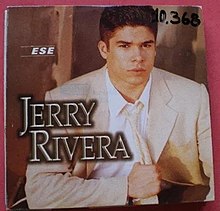| "Ese" | ||||
|---|---|---|---|---|
 | ||||
| Single by Jerry Rivera | ||||
| from the album De Otra Manera | ||||
| Released | October 5, 1998 | |||
| Studio |
| |||
| Genre | Latin pop · Salsa · bolero · latin ballad | |||
| Length | 3:25 (Ballad version) 4:19 (Salsa version) | |||
| Label | Sony Discos | |||
| Songwriter(s) | Alejandro Jaén · William Paz | |||
| Producer(s) | Alejandro Jaén · J. Salazar · Ramón B. Sánchez | |||
| Jerry Rivera singles chronology | ||||
| ||||
"Ese" (English: He's The One) is a song performed by Puerto Rican-American singer Jerry Rivera from his ninth studio album De Otra Manera (1998). The song became his first #1 on the Hot Latin Tracks chart and fifth overall on the Tropical Airplay chart. It was acknowledged as an award-winning song at the 2000 BMI Latin Awards. [1] Two versions of the song were recorded, one in salsa and the other a bolero. [2] The success of releasing two versions of the song to Latin radio stations led to Sony Discos having their artists record multiple versions of the same song. [3] José A. Estévez Jr. of AllMusic felt that Rivera "demonstrates with conviction" in the song. [4] Eliseo Cardona of El Nuevo Herald stated that the song "can be taken as a signal of alert (and also of alarm) It shows in any case that it was already time to get out of the monotony accumulated by his discography After listening to the song (also recorded in salsa) it is force majeure to recognize that the latter was fulfilled." [5] The song was later featured as the main theme for the Mexican telenovela Mirada de mujer (1998). [6] The music video for the song featured the ballad version and was directed by Steve Bielo. [7]
Charts
Weekly charts
|
Year-end charts
|
See also
- List of number-one Billboard Hot Latin Tracks of 1999
- List of Billboard Tropical Airplay number ones of 1999
References
- ^ "BMI Honors Top Latin Writers and Publishers". Broadcast Music, Inc. May 1, 2000. Archived from the original on September 23, 2015. Retrieved June 29, 2015.
- ^ Rivas, Josue R. (February 9, 1999). "Jerry Rivera numero uno, diez anos despues". El Diario La Prensa (in Spanish). p. 21. Retrieved July 25, 2022 – via ProQuest.
- ^ Lannert, John (January 8, 2000). "Dual Singles Boost Latin Acts". Billboard. Vol. 112, no. 2. p. 107. ISSN 0006-2510. Retrieved June 22, 2022.
- ^ Estévez, Jr., José A. "Jerry Rivera - De Otra Manera Album Reviews, Songs & More | AllMusic". AllMusic.
- ^ Cardona, Eliseo (March 11, 1999). "Lo que suena". El Nuevo Herald (in Spanish). p. 12D. Retrieved July 25, 2022 – via Newspapers.com.
- ^ Connor, Olga (March 14, 1999). "Miami en su gran fiesta". El Nuevo Herald (in Spanish). p. 1. Retrieved July 25, 2022.
- ^ "Grabación del Video Tema "Ese - versión balada"" (in Spanish). Archived from the original on March 4, 2000. Retrieved May 1, 2023.
- ^ "Jerry Rivera Chart History (Hot Latin Songs)". Billboard. Retrieved May 22, 2021.
- ^ "Jerry Rivera Chart History (Latin Pop Songs)". Billboard. Retrieved May 22, 2021.
- ^ "Jerry Rivera Chart History (Tropical Airplay)". Billboard. Retrieved May 22, 2021.
- ^ a b "1999: The Year in Music". Billboard. Vol. 111, no. 52. December 25, 1999. pp. 76, 78. Archived from the original on May 15, 2022. Retrieved December 10, 2011.